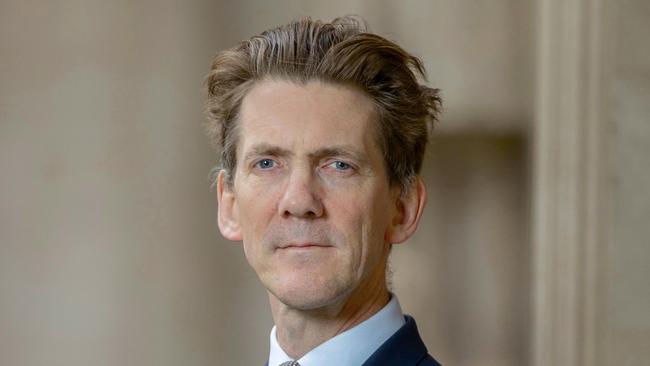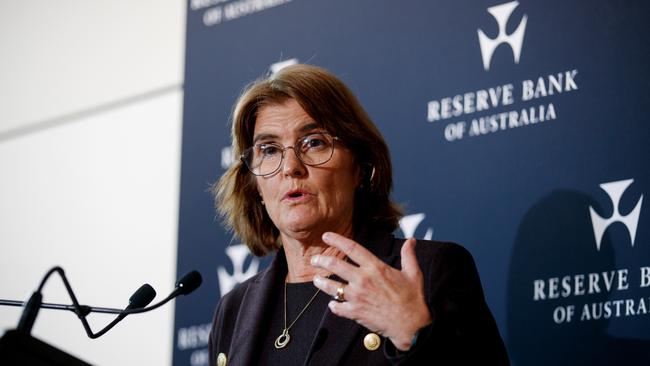RBA’s Hauser slams ‘false prophets’ on interest rate policy
Deputy governor Andrew Hauser warns against ‘overconfidence’ on interest rates that could cause ‘poor analysis and decision-making that could harm the welfare of all Australians’.

Business
Don't miss out on the headlines from Business. Followed categories will be added to My News.
Reserve Bank deputy governor Andrew Hauser has warned against “overconfidence” on the outlook for interest rates, while outlining two-way risks for unemployment and household consumption that could affect the outlook for inflation.
In a speech to the Economic Society of Australia in Brisbane on Monday, Mr Hauser said anyone claiming that interest rate prescriptions were “obvious” were “false prophets”.
“Of course, eye-catching language sells newspapers, secures clients and draws crowds to the soapbox,” he said.
“But when the stakes are so high, claiming supreme confidence or certainty over what is an intrinsically uncertain and ambiguous outlook is a dangerous game.
“At best, it needlessly weaponises an important but difficult process of discovery. At worst, it risks driving poor analysis and decision-making that could harm the welfare of all Australians.”
Mr Hauser – who joined the RBA in February after a distinguished career at the Bank of England – said that Australians are right to want to be confident that the central bank will bring inflation back to target and maintain full employment in accordance with its dual mandate.
“That is the RBA’s mandate, and we should be held to account for it,” he said.
“But the policy strategy required to deliver that outcome, and the economic judgments that inform it, simply cannot be stated with anything like the same degree of certainty,” he added.
“Those pretending otherwise are false prophets.”
The RBA board, led by Michele Bullock, left interest rates on hold as expected after its August meeting last week.

After cutting rates to a record low near zero during the Covid-19 pandemic and then hiking rapidly to a near 13-year high of 4.35 per cent to clamp down on inflation caused by supply shortages and pent-up demand during the pandemic, the RBA has kept rates on hold since November.
But while inflation has come down, it has been stickier than expected this year.
In his speech, Mr Hauser appeared to argue for a “less activist” approach to interest rates now.
“Of course, the billion-dollar question is how to map essentially uncertain judgements into policy decisions,” he said.
“That is really the subject for another speech – but the short answer is one should seek to choose strategies that are responsive to, and also robust to, your evaluation of the risks to the outlook as much as to the central projection,” he said.
“In some cases, uncertainty may induce you to be less activist – as you wait for more data, or try to avoid triggering tail risks through your own actions.
“In others, it can induce you to be more activist: for example, the asymmetry of potential outcomes underpinned the policy response in many countries during the Covid-19 pandemic.”
Mr Hauser said the RBA must “guard against overconfidence” in its outlook for economic demand. In its latest statement on monetary policy, the RBA considering alternative scenarios and the potential for “potentially sharp changes in behaviour.”
“Assuming that unemployment rises only gradually, the central projection is for consumption
growth to pick up in line with an expected recovery in household real incomes,” he said.
“But consumption also depends on the extent to which households choose to spend or save these higher incomes – and we are much less confident in that judgment.”
Mr Hauser said it’s “possible that households fortunate enough to have accumulated assets in recent years may choose to spend rather more than past relationships suggest.”
In aggregate, household wealth has jumped 58 per cent over the past five years – much more than incomes – and that “could pose upside risks to consumption”, according to the RBA.
At the same time, other households, particularly the young, have been forced to cut their spending back sharply as real incomes have fallen.
As inflation falls, rising real income may relax some of those constraints, allowing such households to “increase their spending by more than historical relationships would suggest,” Mr Hauser said.
But it’s also “possible that persistent uncertainty about the future may cause them to rebuild savings or pay down debt, posing downside risks to consumption”.
More Coverage
Originally published as RBA’s Hauser slams ‘false prophets’ on interest rate policy





